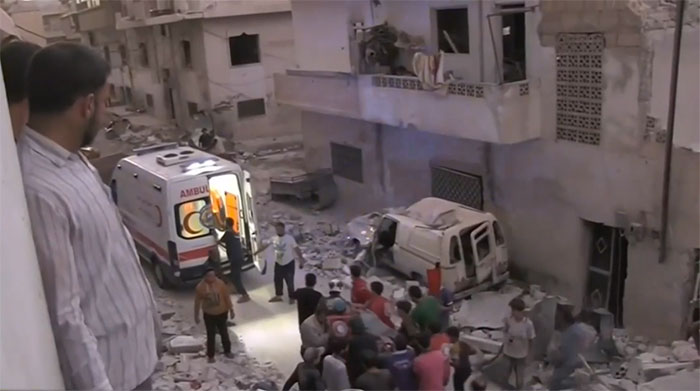Last week, cluster bombs were used in an attack on a hospital in Aleppo, NBC News reported. Cluster munitions are an internationally prohibited weapon because they mainly cause civilian casualties. As part of the global day of rage for Aleppo, PAX – backed by some 250 protesters – urged Russia last week to immediately stop bombing civilian targets, such as Aleppo.
Civilian targets bombarded
The cluster munitions that were used in the attack on the hospital in Aleppo are Russian-made, according to NBC News. The use of cluster munitions is unacceptable and the bombing of civilian targets demonstrates a shocking disregard for human life and international law.
Several experts and sources identified Russian-made cluster bombs called ShOAB 0.5 submunitions – explosive bombs that are dropped by a RBK-500 cluster bomb. Both are known to have been used by both Russian and Syrian forces.
Cluster munitions are prohibited under the international Convention on Cluster Munitions (CCM). Neither Russia nor Syria have joined this groundbreaking treaty, but the use of this indiscriminate weapon on a civilian area may constitute a war crime.
Disastrous consequences
Cluster munitions do not only cause civilian harm at the time of conflict, but also long after conflict ends. Many explosive submunitions do not explode on impact and come to function as a de-facto landmines.
“Do you know who pays the price for the use of cluster bombs? Civilians.” says Alexandra Hiniker from PAX. “It is sickening that cluster bombs – a banned weapon – were used in an attack on a hospital. And it is sickening to think that cluster bombs do not disappear after the last bomb has been dropped. In every case where cluster munitions have been used, it has been shown that these weapons continue to claim the lives and limbs of civilians years and even decades after their use.”
International ban on cluster bombs
Because cluster munitions mainly cause civilians casualties, their use, production, stockpiling and transfer has been banned by 119 countries. While countries that are party to the CCM have outlawed these harmful weapons, use of cluster munitions in Syria used by various parties has been reported since 2012 cluster munitions. The use of this prohibited weapon recently increased when Russia and Syria started their joint military operation.
United Nations General Assembly
This month countries around the world will meet at the United Nations in New York to discuss several important disarmament issues in the framework of the UNGA First Committee on Disarmament and International Security. PAX will be present and will urge countries to sharply condemn any use of cluster munitions. We will also push for a resounding “yes” vote in favor of a UN-resolution for a cluster munition-free world. This resolution allows countries to support the international rejection of cluster munitions and show solidarity with affected countries and victims. So far over 150 countries have spoken out against the use of cluster munitions in Syria.
Read more about the work of PAX on banning cluster munitions.




